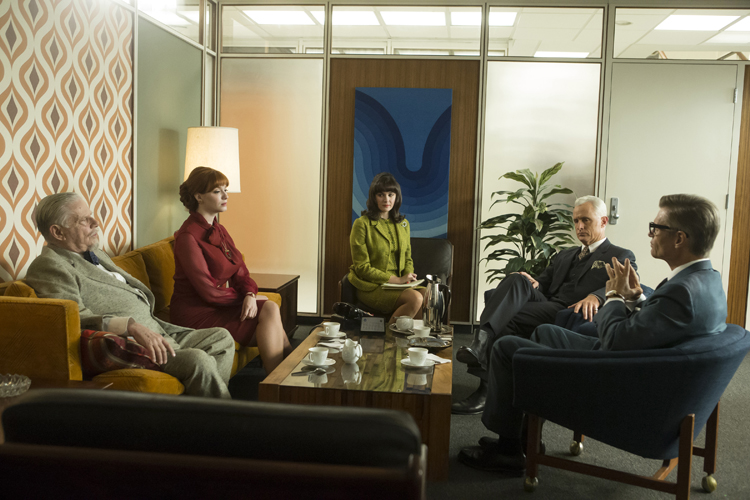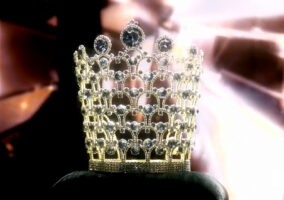 Robert Morse, Christina Hendricks, Christine Garver, John Slattery, and Harry Hamlin in AMC’s Mad Men
Robert Morse, Christina Hendricks, Christine Garver, John Slattery, and Harry Hamlin in AMC’s Mad Men
“Keep pretending. That’s your job.” – Dawn
“Just cash the checks. You’re gonna die some day.” – Ted
There you go. The Mad Men Mission Statement in a nutshell. But honestly, the episode wasn’t as dark as those quotes suggest. The bleakness of last week’s episode wasn’t really evident here, a storytelling choice we welcomed gladly. It’s not that everyone’s existential angst suddenly lifted; more like everyone was just getting on with things (“Life goes on,” says Don rather tritely and impotently to Sally), with occasional bursts of righteous self-assertion and even a stroke of luck or two.
In fact, this is our favorite kind of Mad Men episode. Because we were not particularly in love with season 6, we wonder if this isn’t our favorite Mad Men episode in quite a long time. Everyone remembers the really seismic episodes of the series, like when the Sterling Cooper partners blew up the agency and started Sterling Cooper Draper Pryce or when Betty threw Don out for good or when Peggy got promoted to copy writer and celebrated by unexpectedly giving birth. But we’ve realized, as the show is winding down and there’s a feel of things heading toward whatever sort of non-conclusion Matthew Weiner is likely to have planned, that as we look back on the series, it was always the episodes like this one that were the most satisfying to watch over and over again; the ones that had a series of tiny but sudden micro-shifts in the status quo. Events that ripple outward. Sally’s roommate’s mother dies and because of that one event, Dawn gets a promotion, Joan gives herself a promotion and Don gets something only the truly charmed and/or privileged (and you could argue that Don is both) ever get in life: a second chance.
It’s become something of a cliche to pick up on pretty much any metaphor or motif on this show and say, “This is the theme of Mad Men.” But even if no one will ever fully agree on what the for-real, final, absolute theme of Mad Men is, it’s hard to deny that the show has at least spent a significant amount of time obliquely examining the idea of change; how it plays out and how it affects people. Weiner & Co. set out to, not so much rewrite the ’60s as a decade as to challenge the dominant story being told about it. For the vast majority of people, it wasn’t a decade of free love and political protests. Again and again, the show tells a story where change happens on the periphery or under people’s feet without them realizing it. Again and again, it does this on scales both large and small. Small-scale: Don and Sally’s reconciliation. Large-scale: The civil rights movement causes drastic changes in how black people are perceived and interacted with by the main, white characters.
One recurring motif in the show’s story is where women advance suddenly and unexpectedly because of some sort of drama happening independent of them. Peggy basically got promoted to copywriter because Don got into a pissing match with Pete. Joan wouldn’t have thought to ask for a partnership in exchange for prostitution if Lane hadn’t been desperate to convince her not to ask for money, which would have revealed his embezzlement to the rest of the partners. Dawn got an initial promotion (in her eyes, at least) to managing the time cards and supply closet because Joan got into an argument with Harry over Scarlett’s time card and had the prostitution thing thrown in her face in the middle of a partner’s meeting, making her realize she needed to stop thinking like a secretary herself and start thinking like a partner. We’re not exactly sure why the creators choose to have women’s career advancements occur in this way, but they did it twice again with this episode. Dawn finds herself sitting in her own office because Don tells too many lies for any one person to keep track of (and because Lou Avery is essentially the Joffrey Baratheon of SC&P) and Joan finds herself in a big fat account “man’s” office, right next to Roger’s office, because Jim Cutler is plotting and scheming like crazy and he’s got his eyes set on Roger at the moment.
In fact, there’s something a little telling about the events and decisions that landed these two women in their brand new offices. Jim, it would seem, has a Machiavellian-like ability to suss out people’s weak spots. Essentially telling Joan to promote herself and take the office next to Roger’s could indicate that he’s figured out the extent of their history with each other and knows that her presence as an executive right outside his door is going to serious unnerve Roger. And we kind of wonder if Joan didn’t hand Dawn the means to eavesdrop on any conversation happening in the conference room because she figured out the extent to which Dawn is still Don’s girl and doing his bidding in the office. Earlier, Roger tried to joke with Lou in the office the way he used to with Don and found it to be a wholly unsatisfying experience in comparison. We wonder if some of the partners actually miss Don and want him back.
Don himself is adrift, an “ex-wife” still getting alimony from the agency he helped create; unable to look for new work because of his contract and slowly coming to the realization that, while the industry is still intrigued by him, his outburst of honesty at the exact wrong moment in his life may have permanently damaged his reputation on Madison Avenue. He’s a lonely, powerless middle-aged man in an apartment that’s looking increasingly run down, marking the liquor bottle in the vain hope he can somehow control that which he’s never been able to control.
Meanwhile, the show suddenly discovers black people. Or at least, that’s how it felt. Dawn has been, for the most part, a disappointingly undeveloped character with little in the way of motivations except to be a good girl and keep her head down. Apparently, what she needed was a Shirley in the office. Watching these two women have a highly entertaining breakroom chat that was half bitching about their bosses and half acting as a Greek chorus for the rest of the story was the best part of the hour. “Who the hell is buying her flowers?” We loved the obvious in-joke of them calling each other by their own names; an indication of just how much all the white people in the office tend to mix the two of them up.
And in maybe not the most satisfying ways, the show finally attempted to address racism, which is something it’s largely failed to do effectively over the length of its run. We joked on twitter that this was the “Everyone yells at black people” episode of Mad Men. Shirley and Dawn both got (figuratively) slapped around by their respective bosses, but the show seemed to back off the suggestion that either Lou or Peggy are outright racists. In other words, both the black characters got treated like shit by their bosses, but only because their bosses were acting like assholes, not because of any real racism. We wouldn’t have noticed or cared about that much, except that the story ultimately decided to make the “real” racist Bert Cooper, thereby giving it a somewhat toothless, ineffectual, outmoded feel. We actually think Peggy does have some latent race issues. She once made it clear to Dawn that she was uncomfortable leaving her purse out all night in front of her. And instead of drunkenly embarrassing herself in the office (Oh, is she ever Don 2.0), Peggy might want to examine why she never once thought to consider that the roses on her secretary’s desk might actually be for her secretary. Because honestly, you put a white girl at that desk and the story wouldn’t play out that way. To simply lift a gift off a person’s desk in the assumption that it must be yours indicates that you don’t quite see that person as on your level or worthy of consideration.
Then again, and (sort of) in her defense, Peggy’s clearly pretty rough to work with at the moment. It’s not exactly shining the best light on her to have things play out this way, but without a mentor like Don or Ted in her professional life, she seems to be falling apart. Ginsberg seems to hate her and we actually feel bad for Stan, who seems to get the brunt of her frustrations all the time. This was not her finest hour by a long shot. But while we appreciate the idea of showing a darker, less perfect side of Peggy’s personality, the “falling apart because A MAN” thing is such a cliche. If she could rebuff Pete’s daily office cruelty back when she was barely post-virginity, we think she should be able to handle the idea of Ted still existing somewhere thousands of miles away without completely losing her shit. We think we’d have liked the idea of exploring this Brooklyn working class girl’s latent, subtle racist tendencies despite all her advancements and sophistication. Instead we got “pathetic spinster.” Oh, well. They gave us the Dawn & Shirley show, which makes up for it.
But what really made this episode for us was another highly satisfying exploration of the greatest, most important relationship Don Draper’s life; the one he has with his daughter Sally. All of the most poignant, infuriating, and heartbreaking episodes have centered around this relationship. And to Don’s amazement (and that was a look of raw amazement on his face at the end), it turns out that the only thing he needed to repair what looked like an irreparably damaged relationship was some actual, no-bullshit honesty for once. That moment of Hershey-whorehouse conference room honesty of last season cost him everything; making manifest that which he always feared the most: If people found out the truth about him, his life would be destroyed. But here’s Sally, the only person in his life willing to angrily point out his bullshit and get him to actually listen to her. We think the central question of these season was the one posed in its opening seconds by Freddie Rumsen: “Do you have time to change your life?” With one short moment of honesty, Don managed to do that. “Happy Valentine’s Day. I love you” is the most loving, beautiful thing anyone has ever said to him, loaded as it was with forgiveness of his many flaws and transgressions. He’s too reserved and repressed to truly show it, but we’re pretty sure that look of amazement on his face hid a much deeper feeling of ecstasy. If Sally can love him, even after all the shit he’s put her through, then maybe change really is possible. It’s what he wanted to believe in that moment, as he watched her walk away from him.
Much more to come in our Mad Style post on Wednesday, including the rather disarming side of Miss Bonnie Whiteside.
[Photo Credit: Jordin Althaus/AMC]
Dane DeHaan in Prada at “The Amazing Spider-Man 2” Germany Premiere Next Post:
IN or OUT: Mindy Kaling in Helmut Lang and Saint Laurent at the “Alex of Venice” Premiere
Please review our Community Guidelines before posting a comment. Thank you!



